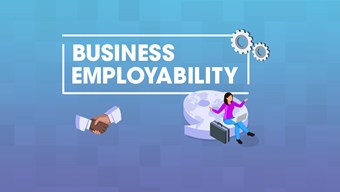Our newly formed Business Advisory Board supports us in achieving transformational and innovative education. We speak to one of our board members, Rachael Gibbens, Director CX Transformation and Chief of Staff, CX APJC at Cisco. She has vast experience with complex cross-border issues, client relationship management, commercial, legal and sales. Rachael achieved her Postgraduate Diploma in Law and Legal Practice Course at our Guildford campus in 2005.
By Editorial Team. Published 13 September 2019. Last updated 14 September 2022
I’ve had a very interesting career trajectory. I started out as a commercial property solicitor in London and worked in that industry for four years. I was made redundant in the global financial crisis in 2008, so I moved to Singapore where I worked as head of business development and marketing for Allen & Overy law firm. After working in that role for three years, I spotted an opportunity at Rolls-Royce in the marine business as commercial manager. This was a role sitting in the heart of the business and took me back closer to my legal background – i.e. negotiating contracts, handling disputes etc. I took 6 months off work to have my twins, and on my return I was promoted to the global head of commercial for the entire marine business (c£700m business). I was then asked by the business to head up the Advanced Offerings sales and I gladly took up the challenge. I now have the pleasure of working for Cisco as the Director CX Transformation, and Chief of Staff, CX APJC at Cisco.
My average day involves working with numerous stakeholders to help implement the Customer Experience strategy and to transform the Customer Experience business so we continue to perform at the highest level for our customers whilst also evolving. Basically, it’s a tremendous amount of stakeholder management and interesting strategic decision-making discussions.
In my role I’ve learned to listen to others and time my response. Learning to be resilient and to accept uncertainty and constant change has been a very good skill to develop.
Attention to detail is always key and is something I learned at law school. Also, managing a heavy workload and juggling many different things at once. Having the ability to look at the big picture and assess the risk against the reward (having a balanced but pragmatic view) would also be one of the skills I think I developed from law school.
It is a great honour and I am excited to work with the school to ultimately help the students on the Business School’s Advisory Board. I am also interested in the whole sphere of education and how it is going to need to change in the coming years with the fourth industrial revolution almost upon us. I think the timing is right for me, and I believe I have some interesting insights and perspectives to add to the board and the students.
The Business Advisory Board will help students gain a competitive advantage by giving them real-world experiences. Learning the world of theory in business is great and gaining a good education through a business degree etc is a very good start. However, I think the Board will help students through our practical experience and passing that knowledge and understanding on will be key.
I hope to bring my energy, drive, and the ability to think differently to the Business Advisory Board. I have had a varied career across multiple jurisdictions, which gives me quite a unique perspective on business.
I don’t think there is a ‘cookie cutter’ template for a great business leader. It all depends on the type of business and the individuals within it. A great business leader can adapt their style to others, think on their feet and evaluate the risk the team is taking while at the same time make bold decisions. A great leader should always empower others around them to excel and must always have integrity in everything they do.
I don’t think there is a single ‘main’ challenge for the next generation of business leaders. In the future there will be many challenges to overcome, often all at once. The world is becoming increasingly VUCA (volatile, uncertain, complex and ambiguous), so operating within this world is going to be tough. The challenges today within business are not just market driven, nor are they at a local level they are geopolitical and inter-correlated with macroeconomics more than ever – so navigating that world and having the ability to pivot within it quickly will determine those that thrive against those that don’t.
A business career is not going to be a traditional career. For example, in the way our parents’ generation perhaps had with one company for many years. I am a good example of someone who has already had numerous career ‘switches’ due to circumstances outside of my control. Be open to change and be open to learning new skills. Never stop learning and upskilling. Read the book by Marshall Goldsmith ‘What Got You Here, Won’t Get You There’. It’s very good advice. Just because you have done X, Y or Z does not guarantee your success in the future, so continue to look for opportunities within business for yourself and to see how you can best thrive.
The most important thing that business school students should be doing, outside the classroom is networking. Network all the time. Talk to lots and lots of people, ask them what they do, what it entails, listen and learn.
Also:
- Don’t stand still when it comes to learning – upskill yourself at every opportunity.
- Read – a lot! Read everything and anything you can get your hands on – the news obviously, but read things going on in other sectors, and what’s ‘up and coming’ to keep yourself relevant.
- Have a side ‘hustle’. If you have a passion for something and you have the funds, give your own business venture a crack. If it fails, you’ll learn from it, if it doesn’t then that’s fantastic.
- Volunteer for opportunities – you never know where it will lead.
Find out more about our undergraduate and postgraduate business courses.



